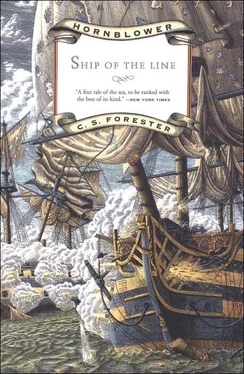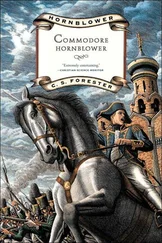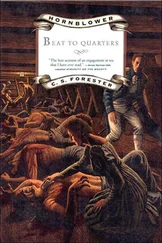“ Cassandra, sir, thirty-two, seems to me. She convoyed us last v’yage.”
“Captain Frederick Cooke, sir,” added Vincent, flipping hastily over the pages of the printed list.
“Ask her number and make sure,” ordered Hornblower.
Cooke had been posted six months later than he had; in the event of any combined operations he would be the senior officer.
“Yes, she’s the Cassandra, sir,” said Vincent, his eye to his telescope, as a hoist of flags went up to the frigate’s foretopsail yardarm.
“She’s letting fly her sheets,” said Bush, with a hint of excitement in his voice. “Queer, that is, sir.”
From time immemorial, dating back long before a practical flag signalling system had been devised, letting fly the sheets had been a conventional warning all the world over of the approach of a fleet.
“She’s signalling again, sir,” said Vincent. “It’s hard to read with the flags blowing straight towards us.”
“Damn it, sir,” blazed Bush. “Use your eyes, or I’ll know the reason why not.”
“Numeral. Four. Literal. Seventeen—astern—to windward—source—sou’west,” translated Longley with the signal book.
“Beat to quarters, if you please, Mr. Bush. And wear the ship directly.”
It was not the Sutherland’s task to fight odds of four to one. If there were any British ships in pursuit he could throw himself in the enemy’s path and reply on crippling at least two Frenchmen so as to ensure their capture, but until he knew more about the situation he must keep as clear as was possible.
“Ask ‘Are any British ships at hand?’” he said to Vincent while the Sutherland first lay over on her side and then rose to an even keel as Bush brought her before the wind.
“Reply negative, sir,” said Vincent, a minute later, through the din of clearing for action.
It was as he expected, then. The four French ships of the line had broken out of Toulon during the darkness, and while the blockading squadron had been blown away to leeward. Only the Cassandra, the inshore lookout, had caught sight of them, and had run before them so as to keep them under observation.
“Ask ‘Where is the enemy?’” said Hornblower. It was an interesting exercise, calling for familiarity with the signal book, to frame a message so as to use the fewest number of flags.
“Six—miles—astern—bearing—nor’east,” translated Longley from the code book as Vincent read out the numbers.
So the French were lying right before the wind. That might merely be because they wanted to put as great a distance as possible between them and the blockading squadron off Toulon, but it was not likely that the officer in command would run wastefully direct to leeward unless that was the course most suited to his plan. It ruled out completely any thought of Sicily or the Adriatic or the Eastern Mediterranean as objective, and it pointed directly to the Spanish coast near Barcelona and beyond that to the Straits of Gibraltar.
Hornblower on his quarterdeck set himself to try and think the thoughts of Bonaparte at the Tuileries. Beyond the Straits lay the Atlantic and the whole world. Yet it was hard to imagine any useful objective for four French ships of the line out there; the French West Indies had been nearly all reduced by English expeditions, the Cape of Good Hope was in English hands, Mauritius was about to fall. The French squadron might be intended for a mere commerce destroying raid, but in that case an equal number of frigates would be both cheaper and more effective. That was not like Bonaparte. And on the other hand exactly enough time had elapsed for the appearance of Leighton’s squadron on the Catalan coast and the resultant dearth of supplies to have been reported to the Tuileries, and for orders to have been transmitted thence to Toulon. Those orders would bear the Bonaparte stamp. Three British ships on the Catalan coast? Then send four French ones against them. Man with crews picked from all the ships rotting in Toulon harbour. Load them with all the stores for which the Barcelona garrison is clamouring. Let them slip out one dark night, hack their way through to Barcelona, crush the British squadron if they can, and return if they are lucky. In a week they might be safe and sound, and if not—every omelette demands the breaking of eggs.
That must be the French plan, and he would gladly bet all he had that he was right. It only remained to decide how to defeat the French aims, and the opening moves were obvious. First, he must keep between the French and their objective, and second, it would be desirable to keep out of sight of the French, over their horizon, as long as possible—it would be a surprise to them to find a ship of considerable force, and not a mere frigate, in their path; and surprise was half a battle. In that case his first instinctive move had been correct, and the Sutherland was on the right course to achieve both these ends—Hornblower wondered uneasily whether his unthinking mind had jumped at once to the conclusions which his thinking mind had only just reached. All that remained to be done was to call down the Pluto and the Caligula. Three British ships of the line and a frigate could fight four French ships, picked crews or not, and Bonaparte’s opinion notwithstanding.
“Cleared for action, sir,” said Bush, touching his hat. His eyes were bright with the anticipation of action. Hornblower saw in him a fighting man of the type to which he regretted he did not belong—a man who relished the prospect of a battle for its own sake, who loved physical danger, who would never stop to count the odds against him.
“Dismiss the watch below, if you please,” said Hornblower. There was no object in keeping every man at his station when action was far distant, and Hornblower saw Bush’s expression alter when he heard the words. They meant that the Sutherland was not going to plunge immediately into action against odds of four to one.
“Aye aye, sir,” he said, reluctantly.
There was something to be said for Bush’s point of view, for the Sutherland well handled might knock away so many French spars as to leave two or three at least of the French so crippled as to fall a certain prey into British hands sooner or later. It would be at the cost of her own destruction, however, and he could think about it again later. A fair wind today might still mean a foul wind tomorrow; there might still be time for the Pluto and the Caligula to come up if only they could be informed of the proximity of their prey.
“Give me that signal book,” said Hornblower to Longley.
He turned its pages, refreshed his memory regarding the wording of some of the arbitrary signals. In sending a long message there was always danger of misunderstanding. And he pulled his chin while he composed his message. Like every British officer retreating, he was running the risk of having his motives misunderstood, even though as he told himself petulantly, not even the mad British public, gorged with past victories, could condemn him for refusing action against odds of four to one. But if everything went wrong the Wellesley faction might seek a scapegoat; and the order he was about to transmit might mean the difference between success and failure, between a court of inquiry and the thanks of Parliament.
“Send this message,” he said abruptly to Vincent.
Hoist after hoist the flags crept up the mast. The Cassandra was to set all sail she could carry, and to make use of her frigate’s turn of speed to turn westward, seek out the Pluto and Caligula –Hornblower could not be exact in his description of their position—and bring them down to Barcelona. Phrase by phrase the Cassandra acknowledged the signal. Then there was a pause after its completion, before Vincent, glass to eye, reported.
Читать дальше









